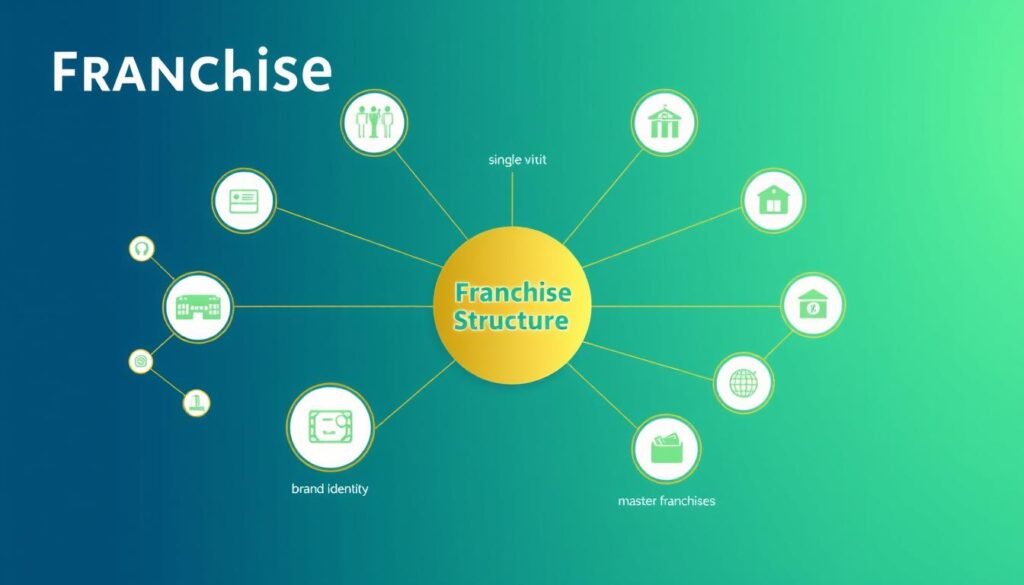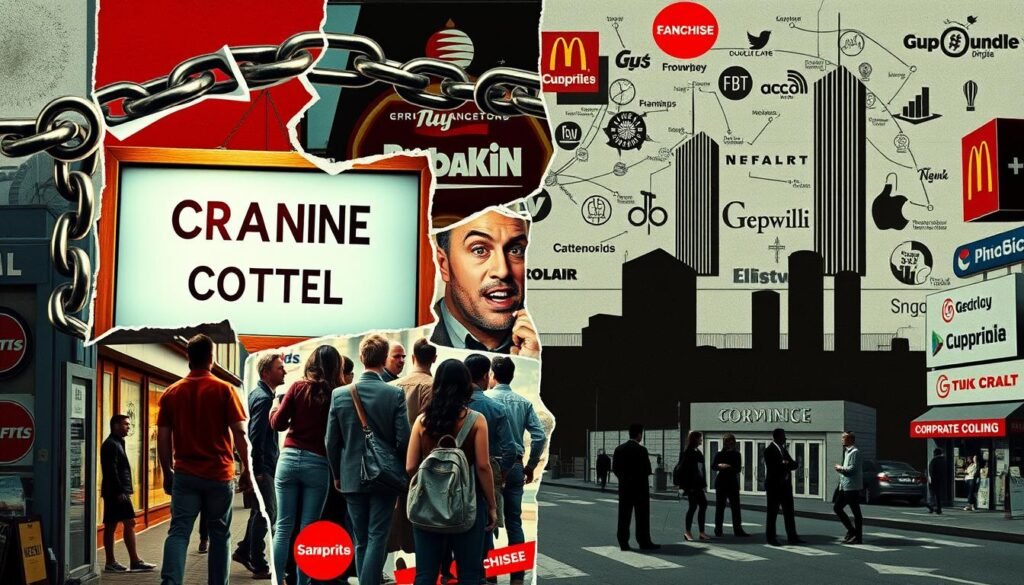Starting a franchise can be a safer way to begin a small business. But it’s not the best choice for everyone. It lets new business owners join a big company and run one or more of its locations. Yet, they must follow the company’s rules and licensing agreement terms closely. This might not fit those who like to work on their own.
To open a franchise, you’ll go through applications, interviews, and background checks. You’ll also need a lot of money at first, like McDonald’s $500,000 in liquid assets and a $45,000 franchise fee. Before jumping into franchising, it’s key to know the good and bad sides of this path.
Table of Contents
Understanding Franchising as a Business Model
Franchising is a growing way for entrepreneurs to start businesses. It’s a deal where a franchisor lets a franchisee use their brand and way of doing things. In return, the franchisee pays fees and royalties.
What is a Franchise?
A franchise lets the owner of a brand give someone else the right to use that brand and its methods. The franchisee pays an initial fee and a part of their sales as royalties, usually 4.6% to 12.5%. This way, the franchisee gets to use a known brand, face less risk, and get marketing help. The franchisor makes more money and gets to advertise more.
Franchise Structure Options
There are different ways to set up a franchise:
- Single-unit franchise: A franchisee runs just one location.
- Multi-unit franchise: A franchisee runs more than one location, which can save money and improve efficiency.
- Area developers: These are franchisees who open many locations in a certain area.
- Regional developers: They manage the growth and operations of franchises in a big area.
These options help both franchisors and franchisees grow and expand their businesses.

Advantages of Franchising for the Franchisee
Franchising lets you become your own boss with many benefits. You get essential business assistance and the strength of a known brand. This makes a strong base for starting a business.
Business Assistance and Brand Recognition
As a franchisee, you get lots of help from the franchisor. This includes training, advice on how to run the business, and access to tested systems. This is very helpful for those new to business. Plus, you get the trust and recognition of an established brand. This means you can start making money faster.
Lower Failure Rate and Buying Power
Franchising has a lower failure rate than starting a business on your own. Franchisees use the franchisor’s power to negotiate better on supplies and services. This means you can make more money and have a stronger business.
| Franchising Benefits | Franchisee Advantages |
|---|---|
| Business Assistance | Brand Recognition |
| Lower Failure Rate | Buying Power |
By using a franchise’s resources and support, franchisees boost their chance of success. They get to enjoy the perks of franchising benefits. These include business assistance, brand recognition, lower failure rate, and buying power.
“Franchising is a great way to start a business with the backing of an established brand and proven systems. The support and resources available to franchisees can make all the difference in achieving long-term success.”
Disadvantages of Franchising for the Franchisee
Franchising has many benefits, but it also has downsides for the franchisee. One big issue is the strict rules and high costs of joining a franchise.
Restrictive Regulations
Franchisees must follow strict rules set by the franchisor. This limits their freedom and decision-making. They have to stick to the franchisor’s ways, even if they think something else might work better locally.
Initial Costs
Starting a franchise is expensive. Franchisees pay fees to the franchisor, like the franchise fee, which can be very high. They also pay ongoing royalties, rent, and other costs, which add up fast. For example, McDonald’s requires franchisees to have at least $500,000 in liquid assets and pay a $45,000 franchise fee.
Some franchises offer financing help, but the start-up costs can still be a big hurdle. Franchising often means higher start-up costs than starting an independent business.
Franchisees also face issues with financial privacy and can have conflicts with the franchisor. Financial advisors can help manage both personal and business finances.

In summary, franchising has many advantages, but the strict rules and high start-up costs are important to think about before deciding.
Advantages of Franchising for the Franchisor
Franchising is great for both the franchisee and the franchisor. The franchisor gets to grow fast without spending a lot of money. This quick business expansion is a big plus for them.
Franchising also gives the franchisor access to capital. Franchisees pay fees and royalties, which helps the franchisor grow and run the business. This extra money is key for funding the franchisor’s plans and daily costs.
Franchisees are often self-motivated and take pride in their businesses. This means lower costs and higher profit margins for the franchisor. The franchisor advantages go beyond just getting more money and growing fast. The franchisee’s hard work can also make the business more profitable.
| Franchisor Advantages | Franchisee Advantages |
|---|---|
| Rapid business expansion | Established brand and business model |
| Access to capital | Ongoing support and training |
| Higher profit margins | Lower failure rate |
The franchising benefits the franchisor in many ways. It’s a great way to grow a brand quickly and get more money. The success of the franchisor and franchisee work together, making it a win-win situation.

Potential Drawbacks for Franchisors
Franchising has many benefits for the franchisor, like quick growth and access to capital. But, it also has downsides that need careful thought. One big issue is the franchisor’s net receipts go down because they only get a royalty from the franchisee, not the whole store’s revenue.
Franchisors also have less control over franchisees, who run their own businesses. This can lead to differences in skills between the franchisor and franchisees. These differences might cause conflicts or misalignment in the franchise.
Starting a franchise can be expensive for franchisors. They must check and manage the franchise network well to avoid problems and keep the system successful. This means providing training, support, and checks to make sure franchisees follow the rules and standards.
Franchisors also struggle to keep quality and customer service the same across all franchises. If one franchisee doesn’t follow the rules or provide good service, it can hurt the whole brand’s reputation. This is a big issue if a franchisee doesn’t stick to the franchisor’s guidelines.
Even though franchising can help businesses grow, franchisors need to think about the franchising risks, franchisor disadvantages, and franchise challenges. They must balance these with the benefits to make sure the franchise model works well in the long run.

| Potential Drawbacks for Franchisors | Description |
|---|---|
| Decreased Net Receipts | The franchisor only collects a royalty from the franchisee, rather than the full revenue of a company-owned store. |
| Less Direct Management Control | Franchisees are independent business owners, leading to potential differences in required business skills between the franchisor and franchisees. |
| High Costs of Franchising | Franchisors must carefully vet and manage the franchise network to avoid conflicts and ensure overall system success, including providing ongoing training and support. |
| Maintaining Consistent Quality and Service | The actions of one franchisee can reflect on the entire brand and damage the franchisor’s reputation if they do not adhere to the franchisor’s standards. |
Franchising can be a powerful growth strategy, but franchisors must carefully weigh the potential franchising risks, franchisor disadvantages, and franchise challenges against the benefits to ensure long-term success.
Key Considerations Before Choosing a Franchise Model
Choosing a franchise requires careful thought from both sides: the franchisee and the franchisor. Evaluating the pros and cons is key. It’s important to do thorough research before making a decision.
Evaluating Franchise Opportunities
Prospective franchisees should look into different options and see if they fit with the brand and its model. They should also get advice on legal and financial matters. Franchisors need to check if potential franchisees have the right skills and resources. They must also support these new owners well to help them succeed.
Here are some important things to think about when picking a franchise:
- Franchise fees and initial costs, which can be from $10,000 to $100,000 or more
- Ongoing royalty fees, which are a part of the sales revenue paid to the franchisor
- Franchise agreement terms, usually around 10 years, showing the franchisor’s commitment and the investment needed
- Restrictions on keeping the business, like non-compete clauses
- The franchisor’s history, growth potential, and the strength of their franchise network
- Reviewing the Franchise Disclosure Document (FDD) with a franchise lawyer’s help
- Looking at the franchisor’s training and support to ensure success
Thinking through all the aspects of the franchise relationship helps both sides make smart choices. This way, they can start a partnership that works well for everyone.
“Franchise consultants like Scott Milas recommend evaluating goals, skills, and exit strategy to choose the right opportunity.”
Franchising as a Business Model
The franchise business model has a long history, dating back to the Middle Ages and ancient China. It became popular in the modern era with the rise of giants like McDonald’s. Today, franchising offers both franchisors and franchisees advantages and disadvantages to consider.
Franchising can be an attractive option for business expansion. It allows franchisors to rapidly grow their brand and access capital. Franchisees get the benefits of a recognized brand, support systems, and potentially higher success rates compared to sole proprietorships. But, it’s not a one-size-fits-all solution. Both parties must carefully evaluate the tradeoffs before committing to a franchise agreement.
Franchise Business Models
There are two main types of franchise business models. Product distribution franchises are common in industries like bottling, gasoline, and automotive. Business format franchises provide an entire system for operating the business, such as in the food and retail sectors.
Advantages and Disadvantages of Franchising
For franchisors, the main benefits include rapid brand expansion, a stable revenue stream, and savings on operational costs. Franchisees get a recognized brand name, initial training, ongoing support, and more. They also benefit from group purchasing power and a network of fellow franchisees.
But, franchising has downsides too. Franchisees may face a lack of independence in decision-making, high initial costs, and mandatory strategies that may not fit their local market. Franchisors must have the infrastructure and resources to support a growing network. Both parties must be ready for the long-term commitment required for success.
The franchise industry is evolving, with new markets and technology playing a bigger role. It’s important for franchisors and franchisees to carefully evaluate the franchise business model, its advantages, and its disadvantages. This ensures their decision matches their business goals and capabilities.
Conclusion
Thinking about franchising as a business model means looking at both the good and bad sides. It’s also key to know your own goals and what you can do. Franchising can give you brand recognition, help with business, and lower the chance of failure. But, it also has downsides like high costs and possible issues with the franchisor.
Both those wanting to start a franchise and franchisors need to do their homework. They should get advice from experts and make sure the franchise fits their future plans. By looking at all the points and making a smart choice, you can see if franchising is right for you. This is true whether you’re starting fresh or looking into the franchise business.
Choosing a franchise should be a thoughtful process. You need to think about your personal and money situation, if you’re okay with the franchisor’s rules, and if you believe in the franchise’s future. With good planning and understanding the franchise choice, you can set yourself up for success in franchising.



